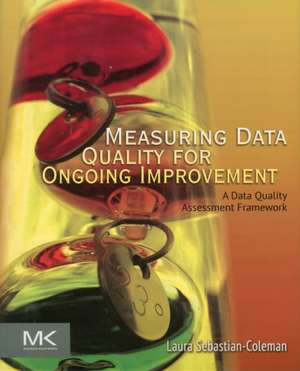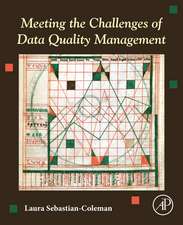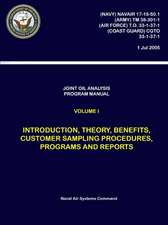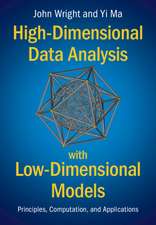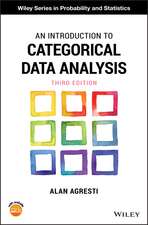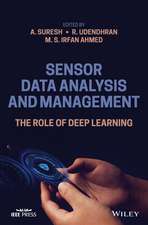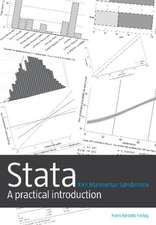Measuring Data Quality for Ongoing Improvement: A Data Quality Assessment Framework: The Morgan Kaufmann Series on Business Intelligence
Autor Laura Sebastian-Colemanen Limba Engleză Paperback – 19 feb 2013
- Demonstrates how to leverage a technology independent data quality measurement framework for your specific business priorities and data quality challenges
- Enables discussions between business and IT with a non-technical vocabulary for data quality measurement
- Describes how to measure data quality on an ongoing basis with generic measurement types that can be applied to any situation
Preț: 247.73 lei
Preț vechi: 296.81 lei
-17% Nou
Puncte Express: 372
Preț estimativ în valută:
47.41€ • 49.31$ • 39.14£
47.41€ • 49.31$ • 39.14£
Carte tipărită la comandă
Livrare economică 07-21 aprilie
Preluare comenzi: 021 569.72.76
Specificații
ISBN-13: 9780123970336
ISBN-10: 0123970334
Pagini: 376
Dimensiuni: 191 x 235 x 23 mm
Greutate: 0.75 kg
Editura: ELSEVIER SCIENCE
Seria The Morgan Kaufmann Series on Business Intelligence
ISBN-10: 0123970334
Pagini: 376
Dimensiuni: 191 x 235 x 23 mm
Greutate: 0.75 kg
Editura: ELSEVIER SCIENCE
Seria The Morgan Kaufmann Series on Business Intelligence
Public țintă
Data quality engineers, managers and analysts, application program managers and developers, data stewards, data managers and analysts, compliance analysts, Business intelligence professionals, Database designers and administrators, Business and IT managersCuprins
Section One: Concepts and Definitions
Chapter 1: Data
Chapter 2: Data, People, and Systems
Chapter 3: Data Management, Models, and Metadata
Chapter 4: Data Quality and Measurement
Section Two: DQAF Concepts and Measurement Types
Chapter 5: DQAF Concepts
Chapter 6: DQAF Measurement Types
Section Three: Data Assessment Scenarios
Chapter 7: Initial Data Assessment
Chapter 8 Assessment in Data Quality Improvement Projects
Chapter 9: Ongoing Measurement
Section Four: Applying the DQAF to Data Requirements
Chapter 10: Requirements, Risk, Criticality
Chapter 11: Asking Questions
Section Five: A Strategic Approach to Data Quality
Chapter 12: Data Quality Strategy
Chapter 13: Quality Improvement and Data Quality
Chapter 14: Directives for Data Quality Strategy
Section Six: The DQAF in Depth
Chapter 15: Functions of Measurement: Collection, Calculation, Comparison
Chapter 16: Features of the DQAF Measurement Logical
Chapter 17: Facets of the DQAF Measurement Types
Appendix A: Measuring the Value of Data
Appendix B: Data Quality Dimensions
Appendix C: Completeness, Consistency, and Integrity of the Data Model
Appendix D: Prediction, Error, and Shewhart’s lost disciple, Kristo Ivanov
Glossary
Bibliography
Chapter 1: Data
Chapter 2: Data, People, and Systems
Chapter 3: Data Management, Models, and Metadata
Chapter 4: Data Quality and Measurement
Section Two: DQAF Concepts and Measurement Types
Chapter 5: DQAF Concepts
Chapter 6: DQAF Measurement Types
Section Three: Data Assessment Scenarios
Chapter 7: Initial Data Assessment
Chapter 8 Assessment in Data Quality Improvement Projects
Chapter 9: Ongoing Measurement
Section Four: Applying the DQAF to Data Requirements
Chapter 10: Requirements, Risk, Criticality
Chapter 11: Asking Questions
Section Five: A Strategic Approach to Data Quality
Chapter 12: Data Quality Strategy
Chapter 13: Quality Improvement and Data Quality
Chapter 14: Directives for Data Quality Strategy
Section Six: The DQAF in Depth
Chapter 15: Functions of Measurement: Collection, Calculation, Comparison
Chapter 16: Features of the DQAF Measurement Logical
Chapter 17: Facets of the DQAF Measurement Types
Appendix A: Measuring the Value of Data
Appendix B: Data Quality Dimensions
Appendix C: Completeness, Consistency, and Integrity of the Data Model
Appendix D: Prediction, Error, and Shewhart’s lost disciple, Kristo Ivanov
Glossary
Bibliography
Recenzii
"This book provides a very well-structured introduction to the fundamental issue of data quality, making it a very useful tool for managers, practitioners, analysts, software developers, and systems engineers. It also helps explain what data quality management entails and provides practical approaches aimed at actual implementation. I positively recommend reading it…" --ComputingReviews.com, January 2014
"The framework she describes is a set of 48 generic measurement types based on five dimensions of data quality: completeness, timeliness, validity, consistency, and integrity. The material is for people who are charged with improving, monitoring, or ensuring data quality." --Reference and Research Book News, August 2013
"If you are intent on improving the quality of the data at your organization you would do well to read Measuring Data Quality for Ongoing Improvement and adopt the DQAF offered up in this fine book." --Data and Technology Today blog, July 2013
"The framework she describes is a set of 48 generic measurement types based on five dimensions of data quality: completeness, timeliness, validity, consistency, and integrity. The material is for people who are charged with improving, monitoring, or ensuring data quality." --Reference and Research Book News, August 2013
"If you are intent on improving the quality of the data at your organization you would do well to read Measuring Data Quality for Ongoing Improvement and adopt the DQAF offered up in this fine book." --Data and Technology Today blog, July 2013
